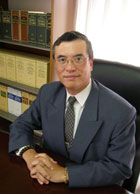|
|
 |
 |
 |
 |
 |
 |
| Kaoru HARAGUCHI |
 |
| Education: |
Chuo University (LL. B.)
The University of Chicago Law School (LL. M.) |
| Memberships: |
Tokyo Bar Association |
| Admission: |
Japan (1989)
New York (1995) |
|
 |
|
|
Kaoru Haraguchi, founding partner, dedicated himself to not only studying everyday, but also playing ping-pong as a player representing Tokyo (the best rank was 2nd in Tokyo) when he attended Komaba Toho High School, dreaming to beat Chinese players.
In those days, Mao Ze Dong, who specified ping-pong as the national sport, agitated the Great Cultural Revolution. As a result, Chinese strong players like Zhuang Ze Dong and Li Jing Guang were forced to disappear from the world stage and Japanese players once again reached the top of the world. In a short time, however, Chinese players came back to fight for the top of the world with Japanese players. (For example, one Japanese player who participated in inter high school tournament in Fukuoka later beat a Chinese player to be a champion in World Cup.)
However, Japanese got to know the fundamental power of China. The Socialist country China increased the population of ping-pong players up to 100 million and sought excellent players nationwide to enhance national dignity. They invented “quick attack in front (rallying in front line, sticking to the table) and developed no-revolving rubber racket with assistance of sport scientist to deprive a title of “kingdom of ping-pong” and widen the gap with Japan.
He acquired the ability to contemplate on relationship with China and understand the genuine national power of China from the experience of his devotion to ping-pong.
When Mr. Haraguchi became a lawyer, the rate to pass the bar-exam was only 1.7%, which means that only one out of 60 people could pass it. In those days, lawyers are said to be well off all his/her life with no competition and retirement.
However, Mr. Haraguchi realized that a lawyer, which is essentially a service industry, would not be protected by difficult high-competitive examinations forever. Therefore, he always considered to establish his specialty to strengthen the barrier to his area in case competition becomes tougher.
As a result, the first area to strengthen that Mr. Haraguchi selected was finance to developed countries.
The reason was when he met a Mexican public official when he was a legal apprenticeship, and was told that Mexico could build a dam and a generator to develop their country if Japan provides finance to Mexico. Hen then began to desire to work with them.
Therefore, he joined a law firm strong in finance, went to study at Chicago University famous for its finance subjects, worked in a law firm in New York strong in finance to Latin America and a law firm in London strong in finance to Eastern Europe. He also was dispatched to Overseas Economic Cooperation Fund, which operated yen finance focused on developed countries.
However, while working in various workplaces, Mr. Haraguchi realized that finance for developed countries usually adopted US law or British law as a governing law and was written in English, which makes little room for Japanese lawyers strong in Japanese law and Japanese language.
At that time, the law firm to which Mr. Haraguchi belonged increased rapidly the work of securitizing Japanese finance assets in the Euro market, and Mr. Haraguchi, who could explain Japanese law in English with no difficulty after the long time of studying abroad and working in the US and UK, started to be involved in securitization of financial asset.
It was the first time that Mr. Haraguchi realized that the work of lawyers was essentially passive and necessary expertise always changes as the society changes.
At the same time, he concluded that the core value of lawyers is the flexibility to adapt to the social changes and is always prepared to respond to such changes. (The bestseller at that time “Where is my cheese?” is the basis for his idea.)
Thereafter, Mr. Haraguchi built his reputation as an expert in securitization of consumer loan credit in the Euro market, and has continued to develop new areas after the Lehman Shock.
Though clients’ evaluation for Mr. Haraguchi changes from time to time, the unchanged parts are as follows:
“You are reliable.” ”You won’t give up.” ”You are patient.” ”You have concentration.”
Mr. Haraguchi thinks that adaptation to social changes, patience and concentration to overcome various difficulties arising in the process of adaptation is his strongest point.
In order to enhance patience and concentration, Mr. Haraguchi has made efforts to maintain and strengthen his physical strength. He was even ranked as the best 8 in Eastern Japan Tennis Tournament for Lawyers Tennis, in spite of the fact that he had only started tennis several years ago.
|
|
 |
|
